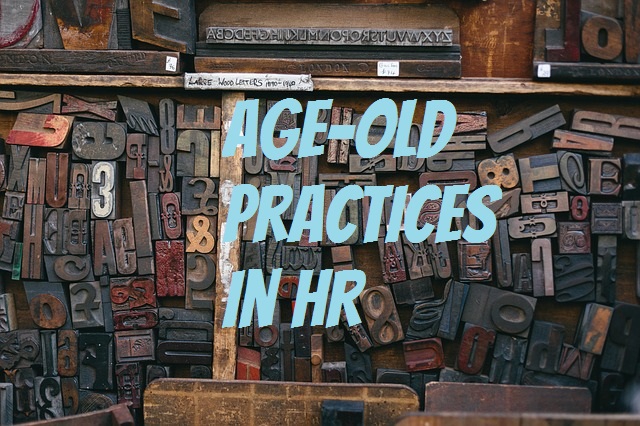Organisations or HR continue with certain age-old practices, which actually hold back optimum performance of employees.
New technologies, new generations and newer ways of working are redefining the modern workplace. These are times when everyone expects to work in an environment that’s open, flexible and enabling. Although the world of work is rapidly moving towards automation and technology-enabled modern ways of operating, there are certain practices that are still holding back organisations in various ways and may not necessarily be required now.
Such age-old, worn-out practices at the workplace may consciously or subconsciously be impacting the workforce in unforeseen negative ways, demoralising employees, thereby hampering optimum performance. The challenge, however, is that in most cases, despite the realisation, organisations or HR hang onto these practices —simply because they have been doing it that way forever. However, there certainly are things that need to change if organisations are to survive the test of time. For the wellbeing of organisations and workforces, the things that HR really needs to get rid of are:
1) Annual performance reviews or rankings: In times of instant or real-time feedback, be it on social media with the instant likes or dislikes or shares across large networks, annual reviews at the workplace make no sense. What exactly is the point in discussing something a year later? Discuss and act ‘now’ when there is still time to improve upon and enhance outcomes. In addition, treat your employees as responsible adults and not school kids, who would require annual testing for promotion to the next grade. Annual performance reviews are pointless, insulting and culture-killing programmes that almost all smart companies are ditching now while switching to real-time feedbacks and discussions on performance.
2) Attendance record-keeping: While employees work from anywhere anytime, the concept of attendance also needs to change. In blurring boundaries between the usual work-hours and non-work-hours, it is foolish of organisations or HR to keep tracking attendance in the conventional ways. The benchmarks could now be about task completion or KRA achievements in a stipulated timeline.
3) Monitoring work hours: HR cannot afford to keep a close watch on employees, monitoring their hours spent working as work and life now blend together for most people. Although there are technologies and tools to keep track of employee work hours and productive time spent working, it is a turn-off for most people if HR consciously keeps track of when employees arrive and depart from work, but ignore the hours they spend working overtime or taking work home.
4) Enquiring about past salary: One’s past salary is private and confidential information and HR has no right to know the same or judge a person’s capabilities based on the same. In fact, it shows an HR manager’s inability to judge candidates based their talent. Pay for what people are worth and not what their past salaries are worth. Moreover, do you tell job applicants how much you make, or how much the manager that wants to hire them makes, or how much the last person in the job was paid? If an HR professional needs to know what another employer paid someone in order to judge what their company should pay them, then they’re worthless in the hiring process, as HR is all about judging the value of workers.
5) Treating human resources as human capital: Employees or human resources are an organisation’s asset, the foundation that makes the organisation stand strong and emerge successful. However, HR need not treat people like they’re numbers in a Power Point presentation or ‘human capital’ that can be sold off like a stock that’s in free fall. They’re humans after all, with emotions, families, fears and aspirations for the future. They need to be respected for their contribution to the workplace. For people who choose to invest their time and energy in the organisation, HR needs to understand and agree that the organisation’s success is all about people.
Value our content... contribute towards our growth. Even a small contribution a month would be of great help for us.
Since eight years, we have been serving the industry through daily news and stories. Our content is free for all and we plan to keep it that way.
Support HRKatha. Pay Here (All it takes is a minute)




































This is absolutely a right thought which every HR person has to think over in today’s scenario.
While I agree with the writer especially on the aspect of respecting privacy with regard to salary, I don’t think the writer has taken into account businesses that have a strong customer interface when opnining on monitoring employee time.
Performance ratings will never disappear. Yes the traditional 5 level rating scales should be scrapped but every employer needs to document and be ready to defend inadequate performance. They also need to identify their “role model” performers. Scrapping all categories makes no sense.
I loved the reference to “annual performance reviews” – I found most managers don’t do them unless under duress; most are incapable of ‘motivating’ an employee to better performance for a year (some cases even until after the performance interview) and waiting a year to terminate an employee for poor performance without interventions earlier is akin to trying to get a rotten apple back to edible condition. Very much the same goes for 360 degree performance appraisals how many employees know what their managers role is and how do they accurately assess performance.
Wishful thinking…pie in the sky…and most CEOs (outside of high tech/start up endeavors) would laugh at this. Or us HR professionals
I am certainly not old school, but the goofy statementsd here are pretty laughable in real life. Most people need at least a semblance of structure. The only thing I agree with is #5, we HR professionals cannot, and leadership cannot, treat employees like human capital, or only a badge, or a faceless entity that is added and subtracted on a ledger sheet.
I get it, times are changing, technology is creating a very different work place…so HR needs to be so much more flexible and interpretive…and informed. To pretend everyone is so happily engaged at work to then drop the pretense of basic rules is ludicrous.
#1 – A performance review is supposed to reflect a year (or half year) worth of work, and it is the formal meeting for discussion that is important. To suggest momentary and fleeting likes and dislikes take the place of real and in depth discussions is silly. Yes, we need to discuss performance real time, but to gather performance and discuss it over time provides trends, consistency and a real opportunity for improvement. And not all smart companies are dropping the practice, most at adjusting the process and making it more meaningful.
#2 – Not everyone can work from home, and not everyone really works from home when they say they are. Horror stories abound from my HR colleagues concerning people “working” from home. Yes, it should be about task completion, but sadly, many people lose focus and intent from home…do we stop working on something when something is done or we go to the next task? We need to better structure expectations, describe success in the long term more than the completion of a task in the short term, and ensure task and that true work is performed. It is.
#3 – Work and life balance is a constant battle for many people, but blending does not mean blurring the work life worlds. No, tracking by the minute is not the answer, but a flexibility and understanding is. Please don’t pretend that people always want to put in the hours of work that it takes to always do a good job, so HR and leadership still needs to provide those tactical parameters.
#4 – The author is off base here completely (and makes we wonder about his other points even more). Salary is a set of confidential information that HR does need to provide offers, succession planning, promotions, etc. It is a key aspect of the interview process (along with understanding skills, attitudes, etc.) and certainly an important part of understanding employees. To suggest that it should be unknown is plain silly. Yes, we all want to pay candidates and employees the right salary, understand fair market value, know industry and geographical trends…it is a tool in our tool bag. HR does not necessarily judge value, we need to understand it and manage it.
When the organisations’ need is “WE”, APRs focus on “I”. There is a contradiction.
Getting rid of it would be one of the wisest things that HR can do.
I’m not sure the tone of the article is helpful. Tossing away all these elements is easy to say, but how will salary increase and promotions be determined when there are no ratings? If performance reviews have objectives , then shouldn’t they be viewed as a business planning tool? How do you determine overtime pay if there’s no timekeeping? The “adult” thing to do would be to provide alternatives. From my perspective the issues here have more to do with bad management than bad HR practices.
Wholeheartedly agree with most of this and would like to better understand how actually planning ahead (if even only a month at a time) to reach goals collaboratively is handled in this model. I would hate to see some of us finally reaching some sort of planning and accountability equilibrium, especially with performance reviews, only to lose the only planning and performance discussion some employees ever get. It’s not just HR that is at fault here, but those leaders who have to be forced to have substantive conversations with their employees in the first place. If we are going to get rid of something, can we replace it, as you suggest, with immediate feedback? This isn’t a question of policy, but one of culture. Eliminating some of these practices will certainly help, but not if we don’t address the underlying culture of patriarchy still holding on from the industrial revolution.
Interesting short summary of people management themes that can be improved in many organizations across the globe. I do think it’s not just up to HR to change all this, as it’s very much about culture. And that is something we all make together; management, employees, support staff as HR and government and unions.
This is a pretty good start to a list of practices HR should have long abandoned as we press into the 21st century.
Let me add at least one more to this list: stop using the term “human resources.” We are people, for goodness’ sake, and deserve to be served. So, why not “People Services?”
My organization already successfully implemented #1 almost 2 years ago. Great innovation.
You’ve made some excellent points!
I agree that “Attendance record-keeping” and “Monitoring work hours” should be discontinued. Unfortunately employees still work after leaving the office. And I think perfect attendance does not translate into perfect performance.
Great article, I hope as many companies as possible change their approach to reflect these insights!
Great points that challenge perceptions in a rapidly evolving world.
Maybe these would work in India…Not much chance of these taking hold in the US. Too much government involvement here.
Don’t ask for innovation, be innovative!
Disagee with asking salary. If a company has pay scales (which most do to ensure equal pay), you need to know if the person fits in the scale. My son tried to discuss salary with an interested company who tried to recruite him. He had worked for them in college and had risen in current job. He also knew he was making good money. They spent time and even had his wife fly out to look at housing as they went through interview process. When the offer came in, it was well below what my son made. He apologized to his ex-boss for wasting their time. There are good reasons why a company needs this information. If someone has made less money, you still put them, using their experience, into the appropriate pay range. Pay is an issue that should be talked about openly.
Totally agree that Annual Performance Review needs to be done away with .. But how do your differentiate performance for increments and bonuses which happens annually? The conversation notes are good idea but are any of you managing a whole Performance Review system in that manner ?
While there is some merit to your suggestions, they should all be viewed contextually. None can be realistically abandoned wholesale by HR. In addition, your definition of the term “Human Capital” is counter to the correct one. Correctly defined with brevity, the term implies that employees ARE assets with future value that can be increased through direct investment in their knowledge, skills, abilities and other characteristics, rather than expenses to be cut. This definition is incomplete but more accurate than what you have stated in your article. In fact, studies show a positive correlation between company performance and human capital investment.
The author’s observations are half a decade too early. Although the trail blazers have already put most of these processes in place, the “one size fits all ” approach cannot be pushed down the org. For instance, processing industries cannot risk time tested approaches just to appear daring.